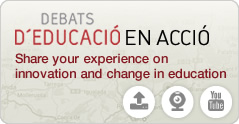- Català
- Español
- English
You are here
How should we build resilient schools to foster all students' learning?
About the speaker
Boris Cyrulnik
French psychiatrist and psychoanalyst famed as the father of the term resilience.
Summary
What is resilience?
Neuroscience has shown that after suffering a situation that has caused extreme emotional pain, brain functions are disrupted and the brain does not work properly, normal connections are broken and information is not understood correctly.
Resilience is the ability to overcome a situation of emotional pain caused by a given event. Even though the effect will persist, the brain will start functioning again normally and the person will be able to continue with his or her life without the trauma causing an insurmountable block.
How are the skills for resilience developed?
- The protection starts to develop at a very young age. Parents' support and affection is very important, as it gives security and the ability to get through difficult times. However, children who are abandoned or suffer physical or mental aggression at home, or come from fragile environments, will be more vulnerable and experience greater difficulty in overcoming traumas if methods are not implemented to foster resilience.
- Experiences with Romanian children abandoned by their parents showed that their brain was affected and relationships with adults were based on fear, as they had not developed this safety net.
- In contrast, the Scandinavian countries help parents stay at home to look after their children without having to take them to school when they are still very young, in order to strengthen the parent-child bond. These children are very self-confident and perform well at school.
- In order to overcome traumas, a meaning must be given to what has happened and the wound must be transformed into dialogue, art, something positive. Art forms, for example, provide a means for expressing the trauma.
- Isolation must be avoided. The individual must feel supported and know that he or she has someone who is fond of him or her and with whom he or she can share the problem. Sometimes, words aren't necessary; the other person's closeness and kindness are sufficient to help overcome traumas. Emotions play a crucial preverbal role.
- Avoid stereotypes that put the blame for traumas on the people who suffer them. For example, "the son of an abusive father will grow up to abuse others"; "women who are raped have brought it on themselves with their provocative attitudes". A person who feels guilty will never overcome the trauma.
Who and how must resilience be cultivated?
- There is a need to train affection professionals. Educators who are able to convey confidence and support in the face of problems.
- The school must foster resilience. There are children with serious family problems for whom the school is the only place where they can find understanding, where they can feel safe and do interesting things. They are able to overcome their trauma and achieve good academic results. However, this is not always the case and there are schools that replicate inequalities or tyrannize pupils, for instance, in the Asian countries.
- The school must become something more than a place for transmitting knowledge. It must educate, encouraging activities that enable children to produce pleasure and share experiences: artistic activities, sports, cooking.
- Policies are needed that foster resilience at school and at home. For example, that enable parents to stay at home and look after their children.
One example of pro-resilience policies. In Rio de Janeiro, the police used to be sent in to quell riots by the youth in the slums, who in turn boasted about their confrontations with the police. Now, educators, artists and sportspeople are sent, with whom they can share experiences. Many kids have gone back to school and stopped fighting the police.
This Debates on Education session has been organized in cooperation with GEDISA (www.gedisa.com) and the Institut Français in Barcelona (www.institutfrancais.es/barcelona).
With the collaboration of:
Discover
other ideas
-

The Problem Solvers: from teaching students to fol...
Charles Leadbeater
2016 -

The Edcamp movement: a peer-to-peer learning init...
Kristen Swanson
2016 -

Revolutionize schools with design thinking and pla...
Ross Flatt
2016







 The texts published on this website are, unless otherwise indicated, covered by the Creative Commons Spain Attribution - Non Commercial - No Derivs 3.0 licence. You may copy, distribute and transmit the work, provided you attribute it (authorship, journal name, publisher) in the manner specified by the author(s) or licensor(s). You may not use the material for commercial purposes. You may not transmit any derivative work from this material. The full text of the licence can be consulted here:
The texts published on this website are, unless otherwise indicated, covered by the Creative Commons Spain Attribution - Non Commercial - No Derivs 3.0 licence. You may copy, distribute and transmit the work, provided you attribute it (authorship, journal name, publisher) in the manner specified by the author(s) or licensor(s). You may not use the material for commercial purposes. You may not transmit any derivative work from this material. The full text of the licence can be consulted here: